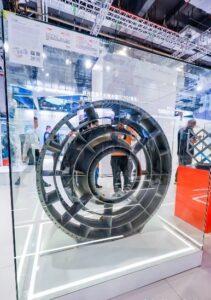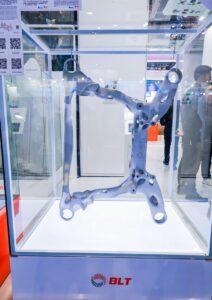In-Depth Interview with BLT: Metal AM Printing’s Shift from Technology-Driven to Cost-Driven
Additive manufacturing isn’t just about comparing build volume sizes across different manufacturers. While build volume is a technical consideration, it’s only part of the bigger picture.
To truly penetrate the industrial sector and usher in the era of mass production, our products must be manufacturable and affordable for customers. They need to be efficient, high-quality, and stable, with an excellent cost-to-performance ratio.
In the past, competition might have focused on specific metrics, but now it’s more about whether your equipment can help customers run consistently over long periods, if the manufacturers can offer comprehensive industry solutions, and if it can help customers be profitable.
Only under these conditions will the industry fully embrace the technology. Cost-driven production is the most solid foundation for applying this technology effectively in the field.
——-Jia Xin, Deputy General Manager at Bright Laser Technologies (BLT)
Metal additive manufacturing is gradually entering the stage of large-scale application. BLT has achieved revenues of approximately USD 170 million, marking a 34.24% year-over-year increase, with a net income attributed to shareholders of around USD 19.6 million, a 78.11% increase year-over-year, making it the leading publicly traded AM company globally by market capitalization.
At the 2021 TCT Asia show, BLT introduced the concept of the “Era of AM Mass Production,” marking the transition of additive manufacturing from the experimental validation stage to large-scale application. As the focus shifts from being technology-driven to cost-driven, metal additive manufacturing is steadily advancing towards the era of mass production. Jia Xin, Deputy General Manager of BLT, gave an exclusive interview at the 2024 TCT Asia show to further explain BLT’s strategies and the technological innovations driving this shift.
Transitioning from Experimental Validation to Mass Production
Jia Xin pointed out the evolution of additive manufacturing from its initial stages of experimental validation to its current widespread mass application. BLT has astutely recognized this trend and is dedicated to establishing comprehensive metal turnkey solutions. These solutions encompass a wide range of equipment, automatic powder circulation systems, and complementary software ecosystems.
As the additive manufacturing becomes more prevalent, costs are gradually decreasing. Technologies once confined to the aerospace sector are now extensively utilised in daily life domains like molds, bicycles, and consumer electronics. Given the heightened cost sensitivity in these fields, there is a growing demand for solutions that offer both high efficiency and stability.
“In sectors like molds, bicycles, and consumer electronics, the utilization of additive manufacturing is burgeoning, and the volume of applications in these fields may even surpass that of aerospace,” Jia Xin explained. “Therefore, achieving high efficiency and stability is paramount.”
Innovation Drives Large-Format and Multi-Laser Metal AM Equipment to New Heights
BLT has demonstrated exceptional technological prowess and market leadership through innovations in multi-laser metal LPBF equipment, large-format printing, and multi- laser configurations, bolstered by its robust R&D capabilities. At TCT Asia 2024, BLT unveiled a variety of multi-laser metal LPBF equipment, including the BLT-S400, BLT-S450, and BLT-S800.
These devices feature an increased number of lasers within the same printing area, significantly enhancing production efficiency and output rates without expanding the equipment footprint or requiring additional operators.
“We currently have the highest number of lasers within the same printing area. Why is this concept significant? It’s because it offers the highest return on investment,” detailed Jia Xin.
Large-format and multi-laser metal LPBF equipment have emerged as prominent trends in the advancement of additive manufacturing. Despite the relatively limited application scenarios for large-format equipment, BLT has devoted substantial efforts to this area, developing equipment such as the BLT-S1500 (Build Dimension:1500mmx1500mmx1200mm, W×D×H) with 26 lasers and the BLT-S800(Build Dimension:800mm×800mm×600mm, W×D×H) with 20 lasers.
“For large-format applications, achieving high efficiency and low costs is paramount to enable widespread adoption that is accessible to customers. BLT has invested heavily in automation, stability, and consistency across the entire printing area to meet the requirements of industrial-scale production,” emphasized Jia Xin.
A Robust R&D Team Drives Innovation
Due to its professional and robust R&D team, BLT consistently introduces innovative products in the field of additive manufacturing. Jia Xin revealed that BLT has over 1,900 employees, with more than 30% dedicated to R&D—significantly higher than the industry average for similar companies. The R&D team covers multiple areas, including materials, equipment, processes, software, and post-processing,

Applications Across Multiple Sectors
BLT’s metal LPBF equipment is widely utilised in sectors such as aerospace, molds, bicycles, and consumer electronics. The company is dedicated to enhancing the automation, stability, and consistency across the entire printing area of its equipment to meet the demands of industrial-scale production. Jia Xin stated that BLT currently has applications in various fields, all of which have high requirements for efficiency and cost-effectiveness.
In the commercial aerospace sector, BLT’s metal LPBF technology has achieved batch production of components such as combustion chambers and tail nozzles. These components are intricately designed and need to meet stringent performance requirements while maintaining low production costs.
“The commercial aerospace sector has a higher acceptance of AM technology because it demands rapid responsiveness and low-cost production, which are precisely the strengths of AM technology,” explained Jia Xin.
In the industrial sector, BLT’s technology has seen widespread application, particularly in bicycle manufacturing and the consumer electronics industry. Jia Xin highlighted that AM technology has demonstrated significant advantages in producing topology-optimized bike frames.
These frames are not only lightweight but also possess high structural strength, meeting the demands of high-performance bicycles. Additionally, BLT’s equipment is increasingly utilized in consumer electronics, including the production of smartphones and other consumer electronic products. am technology is employed to fabricate parts with intricate structures, thereby enhancing product performance and reliability.
During the interview, Jia Xin provided detailed insights into BLT’s applications and technological innovations in the field of die-casting molds utilizing AM technology. Traditional die-casting mold manufacturing processes are known for their complexity, lengthy cycles, and high costs, whereas AM technology offers a more efficient and adaptable solution.
BLT’s integrated equipment, such as the Airbus qualified BLT-S400 can significantly reduce the mold manufacturing cycle and facilitate rapid prototyping of intricate structures. This presents a significant advantage for industries requiring frequent mold replacements and updates.
Moreover, by incorporating optimised cooling channel designs within the molds using AM technologies, cooling efficiency is enhanced, effectively mitigating damage caused by high-temperature loads and frequent thermal fatigue, thereby prolonging mold lifespan and elevating product quality.
Material Innovation and Expanded Applications
In the realm of material innovation, BLT showcases robust R&D capabilities, continually broadening the scope of application and scenarios for AM technologies. BLT develops novel materials tailored for additive manufacturing by conducting research based on specific application requirements. For instance, BLT is actively exploring and advocating the utilization of emerging materials like copper alloys, pure copper, titanium-aluminum, and Ti65.
The integration of these cutting-edge materials not only transcends the constraints of conventional materials but also propels the extensive adoption of AM technology across diverse industries. Moreover, BLT’s production capacity of over 400 metal LPBF equipment enables them to offer printing services for clients, facilitating swift responses to customer demands and continual optimisation of material and equipment performance.
This collaborative approach with customers has propelled BLT to achieve remarkable strides in material innovation, firmly establishing its leadership position within the industry.
Furthermore, in subsequent product presentations, Jia Xin showcased a diverse range of exhibits, including precision shoe molds, cutting tools, lattice brackets, intricate internal flow channels, miniature curved-surface heat exchangers, medical implants, support-free parts, and small-scale crafts, and iconic historical buildings.
Enhanced Software Systems
Furthermore, alongside hardware advancements, BLT has made notable strides in its software systems, introducing BLT-BP 2.0 and BLT-MES systems. These systems facilitate the transition from single-equipment monitoring to factory-level production line management, markedly enhancing the automation level and production efficiency of AM equipment, consequently elevating equipment utilization rates.
The BLT-BP 2.0 system has undergone optimization in terms of user interface and user experience, rendering equipment operation more intuitive and user-friendly. Conversely, the BLT-MES system plays a pivotal role in intelligent scheduling and centralized monitoring.
It enables unified management and scheduling of multiple equipment, real-time monitoring of equipment status and production progress, thus bolstering equipment utilization and production efficiency.
Jia Xin stressed that the successful implementation of the BLT-MES system at various customer sites has enabled the shift from manual operation to automated production. This transition has not only decreased the error rate linked with manual operation but also notably boosted production stability and consistency.
Through these enhancements in software systems, BLT has fortified the market competitiveness of its equipment, catering to the diverse requirements of customers across various industries for efficient, stable, and intelligent production.
Future Outlook
Looking ahead, BLT will continue to align with market demands, developing AM technologies and equipment tailored to diverse application scenarios. BLT’s vision is straightforward: to make metal AM both “feasible and affordable.” “Feasible” means achieving breakthroughs from zero to one, tackling technical challenges, and turning customer ideas into reality.
“Affordable” focuses on the engineering and industrialization aspects, addressing issues of cost-effectiveness, consistent quality, stability, repeatability, and the reliability of large-scale production.
“In the coming years, we will remain attuned to market demands, fostering continuous innovation, and expanding the application of AM technology across diverse fields,” summarized Jia Xin. When asked about the industry’s concerns regarding whether BLT will produce equipment with more lasers, Jia Xin firmly stated, “It depends on the use case. If our customers need it, BLT will make it happen.”
Through this interview, BLT’s dedication and accomplishments in driving the transition of AM technology into the era of mass production are evident. The company’s remarkable performance in automation, cost management, efficiency, and market responsiveness will undoubtedly propel AM technology to new heights.




